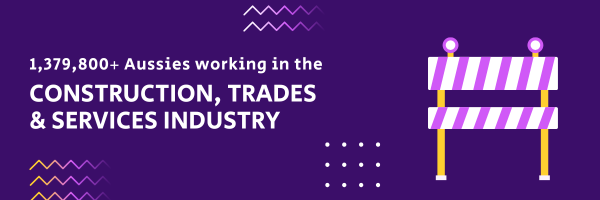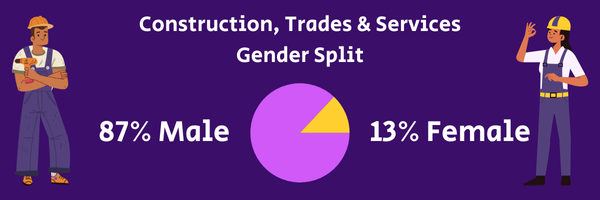Back to employers
Construction, Trades & Services
If you’re after a hands-on career filled with tonnes of opportunities to get your hands dirty, problem-solve and gain a strong sense of satisfaction, a career in trades and services might just be your perfect fit! However, before we go making any big decisions, let’s break it down with our super-helpful industry overview:
What is the Construction, Trades and Services Industry?
You may have heard the term “the trades” thrown around, but do you know what it actually means? In a nutshell, roles in construction, trades and services are skilled jobs that usually involve hands-on work; think building, fixing, installing, maintaining, and creating! So, whether you’re the kind of person who likes solving problems, working with your hands, or just wants a career that doesn’t involve sitting behind a desk all day, you’re bound to find your perfect fit! The trades and services industry is also an awesome choice if you’re keen to get started on your career without spending years at uni. In fact, many jobs in trades start with apprenticeships, which means you can earn while you learn, gaining experience on the job while working toward a nationally recognised qualification.
The best part? There’s no one-size-fits-all in this field. With so many different kinds of trades careers on offer (like plumbing, carpentry, landscaping, air conditioning, and electrical work) you can find a niche that suits your strengths and interests. And because these roles are so essential, there’s always in demand. That means heaps of job opportunities and plenty of chances to upskill or even start your own business down the line.
If you’re still wondering whether the construction industry trades are a good fit for you, think about this: the construction of every single new school, hospital, highway, and home requires the expertise of many skilled tradespeople. Plus, with Australia investing billions into infrastructure, the demand for trades services is only going to keep growing. So, if you’re after a career that’s practical, secure, people-focused, and packed with potential, the construction, trades and services industry could be the path for you!

Different Kinds of Trades
With so many different career pathways within the construction, trades and services industry, you really are spoiled for choice. In fact, choosing from the many different kinds of trades out there might be the trickiest part about launching a career in this industry!
To help you out, we’ve compiled a list of some of the most popular options. However, if these don’t appeal to you, don’t worry too much! There are still plenty of different trades and careers that we haven’t even covered.
Plumbing
Plumbers are the unsung heroes who ensure our water flows smoothly. They install and repair piping systems, ensuring everything from your shower to your kitchen sink works perfectly.
Electrician
Electricians light up our lives; literally! They install, maintain, and repair electrical systems, ensuring our homes and workplaces are safe and powered.
Air Conditioning & Refrigeration
These specialists keep us cool in summer and our food fresh year-round. They install and maintain climate control systems in homes and businesses.
Plastering
Plasterers create smooth walls and ceilings, preparing surfaces for painting and decoration. Their work is the canvas for interior design.
Painting & Decoration
Painters and decorators add the finishing touches to buildings, bringing colour and style to our environments. Basically, they transform spaces with their artistic flair.
Carpentry & Joinery
Carpenters and joiners craft the wooden structures in buildings, from framing walls to creating bespoke furniture. Their skills are foundational in construction.
Road Laying & Highway Maintenance
These professionals build and maintain the roads we travel on daily. Their work ensures safe and efficient transportation networks.
Landscaping & Gardening
Landscapers and gardeners design and maintain outdoor spaces, enhancing the beauty and functionality of our environments. They bring nature closer to our urban lives.
Don’t forget; this isn’t a complete list of every different kind of trade; if you want to take a different pathway, it’s just a matter of doing some extra research and figuring out the right route for you!
It’s also important to note that developing your skills and experience in any of these areas of the construction, trades and services industry could open up global opportunities! After all, every country needs trade workers to help them grow and develop, so why not use your trades or construction job to help you see the world?
What You Could Do
Now that we’ve covered our industry overview and some of the most popular avenues within the construction, trades and services industry, it’s time to discover what kinds of roles you could occupy (and what they might involve)!

Here’s a look at some of the top jobs you could explore:
Plumber
Plumbers are key players in the trades and services industry who make sure everything flows smoothly (literally). Whether they’re working with pipes and ventilation systems or drains, roofing or guttering, their expertise prevents overflows, clogs and other water-related issues! In regard to how plumbers are employed, it can vary from plumber to plumber; some might work for construction firms while others work for independent contractors. It all depends on what works best for each individual in the industry!
Electrician
When you’re thinking about jobs in trades, an Electrician is likely one of the first roles that comes to mind; after all, they’re pretty iconic! These superstars are responsible for all things power-related. This means they’re the ones making sure that our lights stay on and that the electricity systems keep running! This can involve designing, installing or looking after electrical networks for a range of different clients. Like plumbers, they can work for construction firms or as independent contractors, with contracts across all kinds of different sectors.
Air Conditioning & Refrigeration Engineer
Air conditioning and refrigeration engineering is a key job in the trades industry that involves planning, designing, and managing air conditioning and/or refrigeration systems for commercial manufacturers. Professionals in this sector develop designs, oversee fabrication, and troubleshoot complex air conditioning and/or refrigeration systems for residential and commercial use. This might include restaurant units, refrigerated healthcare equipment, and insulated trucks and trailers.
Carpenter & Joiner
Carpenters and joiners are also key players in the construction industry services game who bring tonnes of exciting wood-based creations to life! Their role can involve constructing, renovating and repairing anything made of wood; the possibilities are truly endless! Interested in older pieces? You could also specialise in heritage and antique woodworking if you choose an exciting career in carpentry!
Facilities Manager
When people think of different kinds of trades careers, they don’t always think of Facilities Manager roles (but they should!). Those working in this trade job are responsible for the operational control of buildings and other facilities belonging to a public or private organisation. They coordinate the building’s maintenance and repairs to maintain a safe, clean and productive environment for the occupants. In this role, professionals usually have some trade knowledge that they can use to coordinate basic repairs in-house and know when they need to call in more specialist support.
These job roles are only just scratching the surface; you’ll find that the more you explore the construction, trades and services industry, the more opportunities you’ll come across (and the more likely you’ll be to find the perfect fit for you)!
Construction, Trades and Services Industry Insights
Great news for anyone hoping to join this exciting sector; the construction industry and trades are projected to continue to grow over the next few years.
Industry Growth
According to the Australian Construction Industry Forum, the industry is expected to grow by 0.9% by the end of 2025. While this may not seem like a lot, it’s still pretty impressive given how large the industry already is. In fact, the construction, trades and services industry’s gross value exceeded 175 billion dollars in 2024 (so any percentage of growth is still a pretty huge deal)! Plus, there was a huge 3.6% increase in workers over 2024-25 (which means 47,500 new jobs).
The best part? Growth doesn’t seem to be slowing down any time soon! Projections indicate a Compound Annual Growth Rate (CAGR) of 6.2% from 2024 to 2028, with the industry’s output anticipated to reach AUD 246.06 billion by 2028!
Want to dive a little deeper? Check out these mind-blowing industry insights on Australia’s construction, trades and services industry:
- The industry employs a whopping 1,379,800 Australians (making up 9.5% of the whole workforce).
- Median weekly earnings for workers in this sector is an impressive $1,598.
- 86% of employees in the construction, trades and services industry have landed full-time work!

Graduate Employment
Although a degree isn’t essential for every career pathway within the construction, trades, and services industry (for most roles, you can usually start out in an apprenticeship), it can be helpful for senior and management roles, or if you want to take your skills one step further into engineering!
Knowing what graduate employment looks like can help set your expectations and make further decisions. However, interpreting surveys can be a little tricky, so we’ve done it for you! Here’s some interesting data from the 2023 Graduate Outcome Survey report:
- Engineering (Other) Graduates in full-time employment: 86.8%.
- Engineering (Electrical) Graduates employed overall: 82.8%.
- Building & Construction Graduates employed overall: 87.6%.
Keep in mind this doesn’t account for graduates who freelance or may have continued to higher studies; these are super promising percentages!

Gender Split
Historically, the construction, trades and services industry has been pretty heavily male-dominated. However, more and more women are stepping up and forging their careers in this exciting sector!
According to the Australian government’s Jobs and Skills website, the current gender split in trade jobs is as follows:
It’s also important to note that these figures are for women actively working in the construction industry and trades (and not administrative roles). Essentially, these powerful women are getting hands-on and doing technical and skilled work in the industry, just like the guys!
As the demand for skilled trades workers grows, many companies are focused on attracting and promoting women within the industry to ensure they see it as a valuable and welcoming place to pursue their careers. And as I’m sure our readers know, we’re actively working with employers to help them promote Gender Diverse & Gender Positive workplaces, too!
Average Salary
We all know that the construction, trades and services industry pays pretty well (after all, the employees in this sector are doing super important work!), but how much do those working in the construction industry and trades services actually make? Let’s break it down:
- Plumber Average Salary: $85,000 – $105,000
- Electrician Average Salary: $90,000 – $110,000
- Carpenter Average Salary: $70,000 – $80,000
- Air Conditioning and Refrigeration Engineer Average Salary: $80,000 – $100,000
- Facilities Manager Average Salary: $110,000 – $130,000
- Plasterer Average Salary: $75,000 – $80,000
- Painter Average Salary: $75,000 – $85,000
- Landscaper Average Salary: $60,000 – $80,000
While these numbers are based on the salaries of real people in the construction, trades and service industry, it’s important to note that salaries can still vary (to a certain degree, at least). This means that if you’re starting out in an entry-level role, you might want to go in with slightly lower expectations.
Salaries for jobs in trades (or any careers for that matter!) are also determined by several factors, including:
- The segment of the industry you work within.
- Your job title and seniority.
- The amount of experience you have.
- Any additional qualifications or certifications that give you a specialist skillset.
- The company’s budget.

Qualifications and Entry Pathways
Okay, so you’ve read through our industry page, and you’ve decided that the construction, trades and services industry is the perfect pathway for you; what now? Well, choosing an entry pathway is a very personal decision that will depend heavily on the type of trades job you want to get into.
There isn’t a single rule regarding the kind of education you need to jump into the industry. However, depending on your employer and the sector you’re interested in, you may have to complete your high school certificate. Then, once you’re in the industry, the sky is the limit with the certifications you can earn and the things you can learn on the job!
There are a few trade jobs, such as Air Conditioning and Refrigeration, that require a formal qualification, but don’t stress; you can usually obtain one through TAFE or an apprenticeship.

Entry Pathways for Construction, Trades & Services Careers
All individuals working in trades jobs must hold a white card and additional professional accreditations depending on their speciality area. Once you’ve earned that, there’s no shortage of ways to get into the industry:
- Entering an apprenticeship or traineeship: You can start an apprenticeship and work to gain construction, trades and services-specific qualifications alongside your certificate of education and work experience.
- Work experience once you leave school: If you leave school at 16, you can apply for work experience in entry-level jobs in trades and work your way up over time. That’s right, you can literally start today!
 Qualifications for Construction, Trades & Services Careers
Qualifications for Construction, Trades & Services Careers
TAFE and vocational education pathways are ideal for individuals wishing to pursue careers in construction, trades and services.
Here are a few of the qualifications you could pursue:
Requirements will depend on the different types of trades you’re interested in and the company you want to work with, so make sure you do some research. And remember, whatever your circumstances, grades, or preferred way forward, there’s a qualification pathway that will work for you.
 Best Places to Study
Best Places to Study
Where you choose to study will be dependent on a range of factors, but some top institutions to study trades professions and related subjects include:
Your local TAFE and vocational education providers are also excellent places to reach out to explore your apprenticeship and vocational qualification avenues, especially for future careers in the construction, trades and services industry.
Top Skills You’ll Need
Commitment
When it comes to trades and careers in general, commitment is key. Whether you’re laying bricks in construction jobs or wiring a home as an electrician, showing up every day ready to learn and grow is what sets the pros apart. The best people in jobs in trades are those who commit to mastering their craft, working safely, and taking pride in every task, big or small. Being dedicated not only earns you respect on the job site but also opens doors to higher-paying roles and leadership positions across trades and services.
Punctuality
In the fast-paced world of construction industry trades, timing is everything. Being punctual isn’t just a nice-to-have; it’s essential. Trades jobs often depend on tight schedules where every team member needs to be in sync. When you’re working in trades services like plumbing, painting, or carpentry, being on time keeps projects running smoothly and builds your reputation as someone reliable and professional.
Stamina
Let’s be real; trades jobs can be physically demanding. Whether you’re climbing ladders, lifting materials, or working outdoors in all kinds of weather, stamina matters. In construction jobs, tasks can be long and hands-on, especially in areas like landscaping, plastering, or road laying. Building endurance will help you not only stay productive but also prevent injury and burnout.
Time Management
From plumbing installations to electrical systems and everything in between, all different kinds of trades require excellent time management. Juggling multiple tasks, meeting deadlines, and coordinating with other tradespeople is all part of the day-to-day in jobs in trades. Effective time management helps you stay organised, finish work efficiently, and avoid costly delays in construction jobs. Whether you’re in training or already working in trades services, mastering this skill will take you far.
Teamwork
No matter what area of the construction industry trades you’re in, teamwork is a must. Tradespeople don’t work in isolation; you’ll be coordinating with builders, architects, and other specialists to complete projects. In trades and services, communication and collaboration make the difference between chaos and a well-executed job.
Problem Solving
When pipes leak, measurements don’t add up, or a surprise issue pops up on site, you’ll need to think on your feet. Strong problem-solving skills are a must-have in all trades and careers. Whether you’re in road maintenance or refrigeration, each day brings new challenges and clients rely on your ability to fix problems fast. This is what separates good workers from great ones in the construction jobs space.
Organisation
Organisation keeps the chaos away. In construction jobs, you’ll need to keep track of tools, timelines, materials, and safety protocols. Organised tradespeople are more efficient, less stressed, and more likely to deliver top-quality work. Whether you’re just starting out or have years of experience in the construction, trades and services industry, staying on top of your game with strong organisational skills makes a huge difference.
Responsibility
Finally, being responsible means owning your role and the impact of your work. People in trades jobs often deal with safety-critical systems like electricity, plumbing, or structural frameworks; mistakes aren’t just inconvenient; they can be dangerous. Showing responsibility builds trust with clients, employers, and coworkers. It’s a must-have, especially in the construction industry trades where reliability isn’t just expected; it’s essential.

Where to Learn More
You can learn more about different building, construction, and trades pathways through professional bodies and organisations advocating for careers in the sector.
Some good places to start:
And many more!
Each state will also have several professional organisations to help you learn more about the industry, network, and develop your career.

Apprenticeships & Traineeships: A Definitive FAQ
Dive into all things ‘traineeships and apprenticeships’ in this student-friendly guide. Choose the best path for your future with Explore Careers.
Explore

Different Kinds of Trades
Wondering what different kinds of trades are out there? Dive in for a list of trades in Australia and insights into apprenticeships: find your dream job today!
Explore






 Qualifications for Construction, Trades & Services Careers
Qualifications for Construction, Trades & Services Careers  Best Places to Study
Best Places to Study




